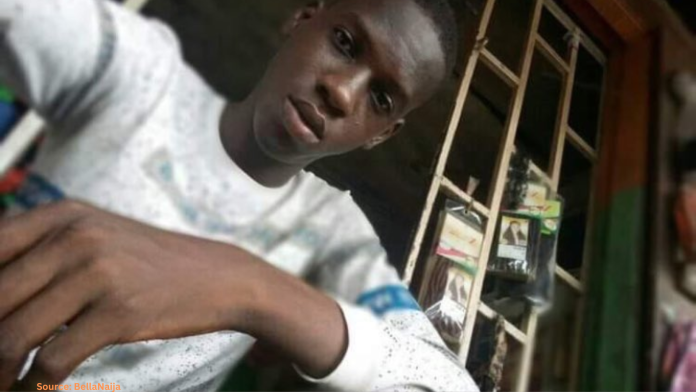- Court demands investigation into journalist Pelumi Onifade’s death as the Lagos State government is ordered to conduct a coroner’s inquest.
- The ruling emphasizes law enforcement’s obligation to uphold the rights of individuals, particularly journalists.
- This case highlights the ongoing challenges faced by journalists in Nigeria and the urgent need for protective measures.
- Organizations like the Media Rights Agenda (MRA) play a crucial role in advocating for justice and accountability in human rights violations.
Newsypeople – A Federal High Court in Lagos has directed the state government to carry out a comprehensive investigation into the death of journalist Pelumi Onifade, who was found deceased following his arrest during the #EndSARS protests in 2020.
This ruling follows a lawsuit filed by the Media Rights Agenda (MRA) against the Lagos State Commissioner of Police, the Inspector-General of Police, and the Attorney-General of Lagos State.

Justice Ayokunle Olayinka Faji underscored the necessity of accountability and justice in cases involving journalists, especially given the circumstances surrounding Onifade’s demise.
Wiki And Bio
|
Biography Facts |
Details |
|
Name |
Pelumi Onifade |
|
Age |
20 years |
|
Profession |
Journalist |
|
Affiliation |
Gboah TV |
|
Incident Date |
October 24, 2020 |
|
Context |
Arrested during #EndSARS protests |
|
Status |
Deceased |
Also Read: Kemi Olunloyo Celebrates 60th Birthday with Heartfelt Gratitude and New Online Ministry
Background of Pelumi Onifade’s Case
Pelumi Onifade, a 20-year-old reporter for Gboah TV, was documenting the #EndSARS protests against police brutality in Lagos when he was allegedly detained by officers from the Lagos State task force. His body was subsequently found in a mortuary in Ikorodu, raising serious questions about the events leading to his death.
The MRA has strongly advocated for justice, claiming that Onifade’s fundamental rights were egregiously violated during his arrest and subsequent death.
Court Orders Lagos Govt To Investigate Pelumi Onifade’s Deathhttps://t.co/palIvgWWZt pic.twitter.com/doEEYaejNU
— Channels Television (@channelstv) August 6, 2024
The court’s decision mandates the Lagos State government to conduct a coroner’s inquest to determine the cause of Onifade’s death, identify those responsible, and ensure their prosecution. This decision underscores the growing demand for transparency and accountability in law enforcement, particularly concerning the treatment of journalists and the safeguarding of their rights.
Court Proceedings and Findings
In the recent ruling, Justice Faji addressed key points regarding the legal responsibilities of the police and the Attorney-General’s office. He highlighted that the Attorney-General has the authority to request a case file from the Commissioner of Police, which is crucial for conducting an inquest. However, the court dismissed five of the MRA’s claims against the police due to insufficient evidence, illustrating the difficulties in gathering adequate documentation and eyewitness testimony.
Despite the dismissal of some claims, Justice Faji emphasized the importance of investigating crimes against journalists, especially those exercising their right to freedom of expression. He reiterated that the constitutional and statutory duties of law enforcement do not permit the unlawful detention of individuals who have not been charged with any crime. This assertion reinforces the necessity for law enforcement agencies to adhere to legal standards and respect citizens’ rights.
Implications for Press Freedom and Human Rights
The court’s ruling has significant implications for press freedom and human rights in Nigeria. It indicates a possible shift towards greater accountability for law enforcement agencies, particularly in cases involving journalists who often face risks during civil unrest. The ruling also serves as a reminder of the ongoing challenges faced by media professionals in Nigeria, where incidents of violence and intimidation against journalists are common.
The MRA’s pursuit of justice for Onifade highlights the vital role of civil society organizations in advocating for human rights and press freedom. Their dedication to holding authorities accountable is crucial in fostering a safe environment for journalists to work without fear of retaliation or violence.
FAQs
Q: What led to the court’s ruling regarding Pelumi Onifade’s death?
The court ruled based on a suit filed by the Media Rights Agenda, which sought justice for Onifade after he was arrested during the #EndSARS protests and later found dead.
Q: What are the implications of this ruling for journalists in Nigeria?
The ruling may enhance accountability for law enforcement and improve the safety and rights of journalists operating in Nigeria.
Q: What actions must the Lagos State government take following the court’s decision?
The government must conduct a coroner’s inquest to determine the cause of Onifade’s death and identify those responsible for it.
Also Read: Ocee’s Shocking Engagement Reveal Shakes Up BBNaija House



